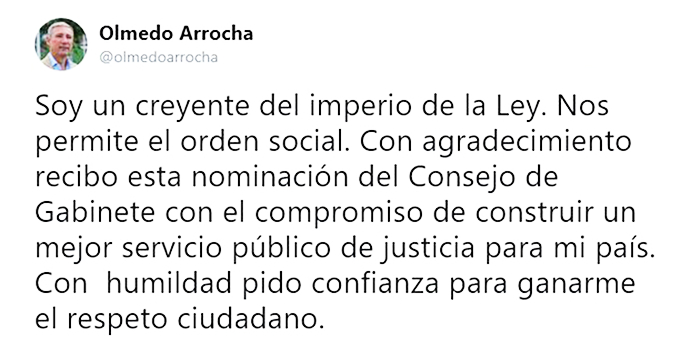
A rerun of the last failed nominations, or have arrangements been made this time?
by Eric Jackson
Deja vu? After failing to fill high court vacancies earlier this year, the president is making another stab at the process. The partisan lineup in a legislature in which his party’s caucus is only third-largest, however, as not on the face of it changed. If the two opposition parties, the Democratic Revolutionary Party (PRD) and Cambio Democratico (CD) gang up again, there will be no replacements and the two magistrates with now expired terms will continue in office until someone else is nominated and ratified.
Recall that about this time last year President Juan Carlos Varela had three high court vacancies to fill, and nominated two while letting one slide. For the civil bench vacancy of the outgoing Martín Torrijos nominee Olmedo Arrocha — a former legislator and veteran PRD activist — he appointed Ana Lucrecia Tovar de Zarak, an undistinguished lawyer who had worked in government regulatory agencies but had the distinctions of having been an active Panameñista Party campaigner and being married to a vice minister in Varela’s cabinet. For the vacancy to be created by the outgoing penal bench magistrate Jerónimo Mejía — also a Torrijos appointee — the president named veteran prosecutor Zuleyka Moore, then working in the Public Ministry’s anti-corruption office on some high-profile cases.
There was already an existing vacancy left by the impeachment of Alejandro Moncada Luna, which has been filled ever since by his suplente Abel Zamorano — if you count him as a de facto magistrate it leaves a de facto suplente missing from the administrative law bench. Were Varela to appoint a nominee to replace Moncada Luna, if approve that person would replace Zamorano. But the president decided to leave what appeared to be well enough alone and leave Zamorano in his acting magistrate status. Moncada Luna’s term will expire in 2020.
Some folks expressed doubts about Moore, wondering whether her appointment amounted to a manipulation or at least worked a disruption to ongoing investigations of crime in high places. Hardly anybody expressed the opinion that she wasn’t well qualified for the high court. Tovar de Zarak, however, was derided as an unqualified partisan figure meant to twist the court into a political stand more to Varela’s liking. There was a public uproar about her appointment.
But also at that time, the PRD and CD were both working hard to distinguish themselves from Varela’s party and each “prove” that they were “the real opposition.” Moore and Tovar were rejected earlier this year, in a process that the president had scheduled to be done in late 2017 special legislative sessions. Moore had excellent credentials but Tovar provided an excuse for a party line vote to reject both nominees. Ortega and Mejía stayed on for lack of replacements.
Now Mejía is acting as judge in the Supreme Court trial of former president Ricardo Martinelli, such that his replacement at the moment would be quite disruptive. Plus Mejía has never been considered the partisan figure that Ortega has been and there is sentiment to give him another 10-year term, an opinion that crosses party lines.
So this time, Varela nominated Zamorano to finish the rest of the Moncada Luna as a magistrate in every sense rather than an alternate temporarily filling a void; and named Olmedo Arrocha to fill Ortega’s spot. Arrocha is considered a capable enough lawyer. These days he works with the Ministry of Economy and Finance. He has been lawyer for the Panameñista Party and for the president himself. He’s an active Panameñista and the brother of Melitón Arrocha, a Panamenista legislator who is now Panama’s ambassador to the United Nations.
Arrocha isn’t as easily discreditable a nominee as Tovar was, but he was not on the list of possibilities submitted to Varela by a citizens’ commission representing important social sectors and he is being widely criticized as a partisan figure.
Has the PRD cut a deal with Varela to go along with Arrocha and Zamorano, in exchange for either a new decade on the high court bench for Mejía, or at least leaving him in place for a new president to determine his future as a jurist? Could be. Ricardo Martinelli’s media and the CD president of the legislature’s Credentials Committee, Sergio Gálvez, speak scornfully about Arrocha such that a deal with CD and the Panameñistas looks quite unlikely. Especially so, as Mejía has taken charge of CD founder Martinelli’s trial for eavesdropping and theft of that spy equipment notwithstanding the ex-president’s constant repetitive frivolous motions. The Martinelistas might just reject Zamorano (a Martinelli pick) and Arrocha to show their annoyance with Mejía.
Before the end of the year we are likely to get decisions on the Zamorano and Arrocha appointments, plus a verdict on the first of Ricardo Martinelli’s criminal trials.
Panama’s Supreme Court of Justice
- Nine members, staggered 10-year terms
- Three benches of three magistrates each: Penal, Civil and Administrative
- On many matters a nine-member plenum decides cases
- Ordinarily each magistrate has an alternate (suplente)
- Suplentes may fill in for magistrates for various reasons
~ ~ ~
These announcements are interactive. Click on them for more information.












